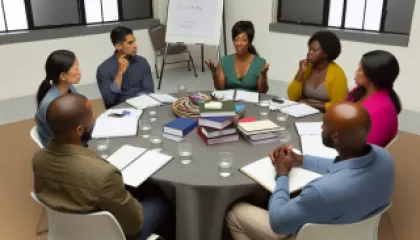Mənim adım Sənəm Hüseynov və mən həyatın bəzi çətin dönəmələrində sizin yanınızda olan, fərq yaratmağı sevən bir terapeyutam. Mənim işim, sizin həyatınızdakı hekayələri dinləmək və onları daha pozitiv bir nöqtəyə yönəltməkdə sizə kömək etməkdir. İnanıram ki, hər birimizin içində güclü, sağlam və təsirli bir hekayət yazarı gizlənir.
Narrativ terapiya ilə işləyərkən, sizin öz həyat hekayənizi yenidən yazmağınıza kömək edirəm. Bu metodla, çətinliklərinizi fərqli bir göz ilə görüb, onları üstələyə biləcəyiniz yeni yollar tapmağa çalışırıq. Birlikdə, sizin güclü tərəflərinizi kəşf edərək, həyatınıza müsbət dəyişikliklər gətirə bilərik.
Uşaqlıqda davamlılıq qurma konusunda isə, uşaqların və gənclərin öz içlərindəki möhkəmlikləri tapmalarına kömək etməyi hədəfləyirəm. Həyatın zorluğu qarşısında güclü durabilmək üçün lazımi vasitələri onlara təmin etməyə çalışıram. Bunu əyləncəli və oyunbaz bir üslubla edirəm, çünki inanıram ki, öyrənmək həm də əyləncəli olmalıdır.
Bir qardaş rəqabəti həllində uzman kimi, ailələrə qardaşlar arasında sağlam münasibətlər qurmaqda yardımçı oluram. Bunu, hər bir fərdin fərqliliklərini və xüsusiyyətlərini qəbul etməyə əsaslanan metodlarla edirəm. Ailə üzvləri arasında anlaşma və hörmət mühitinin qurulmasına kömək etmək bizim əsas məqsədimizdir.
Hobbi və maraqlarımıza gəldikdə, mən aktiv yaşam tərzini sevirəm, xüsusilə də açıq havada gəzmək və yürüş etmək mənə böyük zövq verir. Kitab oxumaq və müxtəlif mədəniyyətlərin musiqisini dinləmək isə, ruhumu dincləndirir və müxtəlif düşüncələrə səyahət etməyə imkan verir. Mən həmçinin, yemək bişirməyi və yeni reseptlər sınaqdan keçirməyi sevirəm, çünki yemək hazırlamaq mənim üçün bir növ meditasiyadır.
Sənəm kimi bir terapeyutla işləməyə qərar verdiyiniz zaman, gülməyin və öz-özünüzlə barışığın önəmini kəşf edəcəksiniz. Birlikdə, həyatın təklif etdiyi hər şeyin qarşısında daha möhkəm dayana biləcəyimiz yollara baxacağıq. Sizinlə bu səyahətə çıxmağa səbirsizliklə gözləyirəm!










